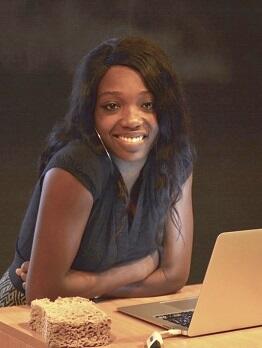
Nathalie Ayi
Mathematician and podcaster
Mathematics trains the mind. It teaches us to reason logically and gives us weapons in a society overloaded with information. It makes us better citizens.
For Nathalie Ayi, Associate professor at Sorbonne University, mathematics is both a language and a tool that needs to be passed on and shared. Since the start of the academic year, she has launched her own podcast in which she interviews other researchers about their careers. And she reminds those who listen that it's important not to close any doors.
When a new student was admitted to the school of Pythagoras, the story goes that he had to take a vow of silence for several years in order to learn humility. The approach of Nathalie Ayi, an associate professor in mathematics at Sorbonne University since 2017, couldn't be more opposite. At 33, this native of Orléans seeks to deconstruct the idea that you have to be a genius or have a gift to go into research.
"I've always been interested in teaching"
This desire to pass on and encourage future students to take the plunge is rooted in her own career path. "I've always been interested in teaching," she says in a small meeting room at the Jacques-Louis Lions Applied Mathematics Laboratory (Sorbonne Université/CNRS/Université Paris Cité), which she joined in 2017, on the campus of the Faculty of Science and Engineering. "My first project was to be a teacher and pass on to younger generations," recalls the young researcher, both of whose parents are mathematics teachers.
Although she describes herself today as a "kineticist", i.e. an expert in the study of equations that include a velocity parameter, she didn't go straight into research. After a scientific baccalaureate and three years of preparatory classes in MPSI (mathematics, physics and engineering sciences) then MP in Orléans, she was admitted as an auditor to the ENS in Lyon. A year later, she moved to the University of Nice Sophia-Antipolis, where she enrolled in a first-year Master’s program. I wanted to be a maths teacher in preparatory classes", she recalls. So, to optimize her chances, she took the agrégation and then a second research-oriented second-year master’s specialisation.
Research was a revelation
It was during her thesis in mathematics applied to fluid mechanics - "what we call the kinetic theory of gases", she points out, and entitled "Influence of stochastics on problems of scale change" - that she decided to change direction. "The research was a revelation," recalls Nathalie Ayi. After defending her thesis in 2016 and a year's post-doctorate at the Inria center at the University of Rennes, she landed a position as accosicate professor at Sorbonne University. "A dream job", she assures us.
Like many students, the young researcher confesses to having had her doubts before embarking on a scientific career. "I didn't think I was capable of doing research or finding new results", says Nathalie Ayi. She adds: "At first, you don't know how it works. You get the impression that you have to reinvent everything, that you have to be a genius to do research, when it doesn't work like that. We go brick by brick. We don't start from scratch. If you work hard, there's no reason why you can't succeed."
Bringing researchers out of their ivory towers
In response to these questions, Nathalie Ayi launched her own podcast channel, Tête-à-tête Chercheuse(s) (Researchers Head-to-head ), in September. This is a series of interviews with female and male mathematic researchers, in which she discusses their career paths and how they see their profession. A way, she says, of getting them "out of their ivory towers", but also of reaching a wider audience, to see "that these scientists also had their doubts, but that didn't stop them from doing what they do today." "I wanted to show that it's accessible. Obviously you have to work, you need skills, but you can't close doors to yourself," she continues.
With three episodes lasting just over an hour, this podcast is aimed in particular at high school students, whom Nathalie Ayi has been meeting for several years at events such as Maths Week, but also with students, and anyone with questions about career guidance. "I talk to young people about my background, my job and the math problems that interest me. People are often happy to see a researcher, to see what it all means. I could see that it had an impact. But it was frustrating to do it on such a small scale," she explains.
Against a backdrop of strong disparity between men and women in scientific fields, and in mathematics in particular, Nathalie Ayi is committed to a more inclusive approach towards women. "It's a theme to which I'm very sensitive", admits the scientist, who also takes part in the "Filles et Maths" (Girls and Math) days, which bring together female students and researchers. For this admirer of the Boltzmann equation, among other things, mathematics is not just a discipline. "It trains the mind. It teaches you to construct a logical reasoning and gives you weapons in a society where we are inundated with information. It makes you a better citizen," she asserts.
